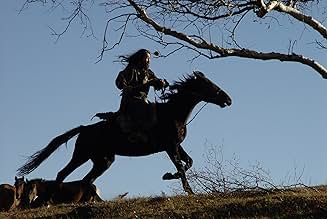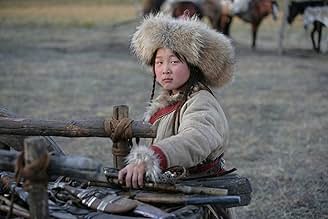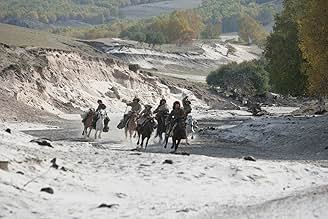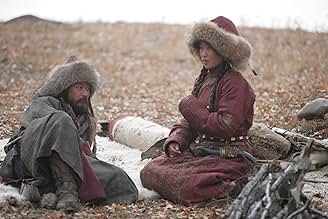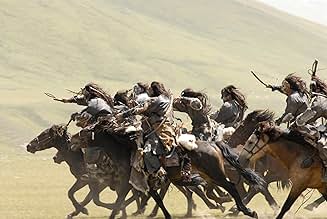IMDb रेटिंग
7.2/10
50 हज़ार
आपकी रेटिंग
कहानी चंगेज खान के शुरुआती जीवन से शुरू होती है जो 1206 में आधी दुनिया को जीतने के लिए निकलने से पहले एक गुलाम था.कहानी चंगेज खान के शुरुआती जीवन से शुरू होती है जो 1206 में आधी दुनिया को जीतने के लिए निकलने से पहले एक गुलाम था.कहानी चंगेज खान के शुरुआती जीवन से शुरू होती है जो 1206 में आधी दुनिया को जीतने के लिए निकलने से पहले एक गुलाम था.
- 1 ऑस्कर के लिए नामांकित
- 16 जीत और कुल 13 नामांकन
Liya Ai
- Oelun - Temudjin's Mother
- (as Aliya)
Baasanjav Mijid
- Esugei - Temudjin's Father
- (as Ba Sen)
Ayuur
- Sorgan-Shira
- (as A You Er)
Huntun Batu
- Altan
- (as Hong Jong Ba Tu)
Deng Ba Te Er
- Daritai
- (as E Er Deng Ba Te Er)
Su Ya La Su Rong
- Girkhai
- (as Su You Le Si Ren)
फ़ीचर्ड समीक्षाएं
To the above two comments.
You know how they say history was written by the victors? That's true for everyone but the Mongols. Most of their history was written by the Chinese, Russians, Arabs, and other conquered peoples who had an interest in perpetuating Genghis Khan = bloodthirsty savage.
The movie is based on one of the few sources about Genghis khan written in Mongolian. It's called the secret history of the Mongols and was written shortly after he died as a record for the Mongolian royal family. He was just a chieftain's's son of a very minor tribe. That's what makes this story so impressive, he didn't start out as a king or a prince with a huge army, like Alexander. Everything he had, he had to earn. He didn't get to be Genghis Khan until he was in his 30's. He was always aware of how victory wasn't assured but had to be paid for with planning and strategy. He wasn't a saint by any means but he wasn't an unthinking savage. This movie is actually meant to be the first in a trilogy with the second one probably detailing his conquest of north china and the third the conquest of the Khwarezim empire in Iran and Afghanistan.
This is an approach that I like because the Alexander movie died on account of it trying to condense all of his conquests into one movie.
You know how they say history was written by the victors? That's true for everyone but the Mongols. Most of their history was written by the Chinese, Russians, Arabs, and other conquered peoples who had an interest in perpetuating Genghis Khan = bloodthirsty savage.
The movie is based on one of the few sources about Genghis khan written in Mongolian. It's called the secret history of the Mongols and was written shortly after he died as a record for the Mongolian royal family. He was just a chieftain's's son of a very minor tribe. That's what makes this story so impressive, he didn't start out as a king or a prince with a huge army, like Alexander. Everything he had, he had to earn. He didn't get to be Genghis Khan until he was in his 30's. He was always aware of how victory wasn't assured but had to be paid for with planning and strategy. He wasn't a saint by any means but he wasn't an unthinking savage. This movie is actually meant to be the first in a trilogy with the second one probably detailing his conquest of north china and the third the conquest of the Khwarezim empire in Iran and Afghanistan.
This is an approach that I like because the Alexander movie died on account of it trying to condense all of his conquests into one movie.
While the plot contained some dubious twists and had rather strange and slow pacing, the overall effect of this movie is stellar. The cinematography rivals, while being similar to, movies such as "Crouching Tiger, Hidden Dragon". The score was amazing. The acting was, to my English speaking eyes and ears, convincing. The few combat scenes were filmed and choreographed to great effect. I am not sure how historically accurate this movie is, but it works as an enchanting piece of cinema. Highly recommended to anyone who likes art films and historical epics. Seriously, the locations make me want to take a vacation to the steppes immediately.
Saw this flick last night and I really loved it. As I understand it many Mongolians hate the film for historical inaccuracies and a heavily accented cast (the lead is from Japan) but if you are unfamiliar with the area and culture you'll find a great story that brings a new light to a historical figure that a surprisingly large portion of the world reviles.
The cinematography is gorgeous and the subtitle script is excellent.
What really makes this film great are the performances and the action scenes.
When he gains followers and unites Mongolia you understand why.
Hopefully the film will get people to read more about the original man and discover the historical inaccuracies.
Of course as historical accuracies go it much more accurate then Elizabeth: The Golden Age.
The cinematography is gorgeous and the subtitle script is excellent.
What really makes this film great are the performances and the action scenes.
When he gains followers and unites Mongolia you understand why.
Hopefully the film will get people to read more about the original man and discover the historical inaccuracies.
Of course as historical accuracies go it much more accurate then Elizabeth: The Golden Age.
I saw this last week at the Toronto film festival and loved it. Many of the people in my group did not want to see it because they were not interested in the subject matter and ended up loving the film. It seemed to be the overall favorite of the group (we saw 12 films in Toronto). There is a fair amount of blood so if one is bothered by violence, you may not enjoy it. In some ways it reminded me of Braveheart because you learned about the history, but there was also beautiful cinematography, landscapes, and very well done battle scenes. This film could possibly be in the running for the best foreign film Oscar.
Astonishingly, the name and the person of Genghis Khan in Sergei Bodrov's "Mongol," a great, Shakespearean drama about this seminal figure in history, don't appear until the very end of the two-hour epic. Instead, we see Temudjin, the man yet to become (posthumously) Khagan (emperor) of what was to be for several centuries the largest contiguous empire in history. Whether Bodrov completes the contemplated two additional chapters of the story or not, "Mongol" stands on its own as a masterpiece.
Contradicting the Western (and Russian) image of Genghis as the monstrous conqueror, Bodrov's work is influenced by Lev Gumilev's "The Legend of the Black Arrow" and is based on "The Secret History of the Mongols," the 13th century Mongolian account, unknown until its re-emergence in China 700 years later. For a director, who learned in school only about the horrors of Russia's 200-year subjugation by the Mongols, taking a "larger view" is a remarkable act.
Unlike Omar Sharif in the 1965 Henry Levin "Genghis Khan" or Takashi Sorimachi in Shinichiro Sawai's disappointing 2007 "To the Ends of the Earth and Sea," Tadanobu Asano in Bodrov's film is strictly Temudjin, not the great Khan. He lived from 1162 to 1227, and "Mongol" covers the years between 1171 and the beginning of the unification of Mongolian tribes around the turn of the century.
In fact, the spookily powerful child Temudjin (Odnyam Odsuren) dominates the first part of the film, undergoing trials and tribulations that make the lives of Dickens' abused and imperiled children look like a picnic. From age nine into his 30s, Temudjin was orphaned, hunted, imprisoned, enslaved, and constantly threatened by extinction. Literally alone in the vast landscape (brilliantly photographed by Rogier Stoffers and Sergei Trofimov), Temudjin escapes death repeatedly, at times almost mysteriously.
"Mongol" is huge - with endless vistas and epic crowd scenes, quite without special effects - but Bodrov keeps the setting just that, never strutting visuals for their own sake. The film is about people, and the cast is magnificent. Asano's face and eyes hold attention, and make the viewer experience simultaneous feelings of getting to know the character he plays and being held at arm's length. Bodrov and Asano escape all the many Hollywood pitfalls in making an epic - they present nothing easy, predictable, trite. The term "Shakespearean" is used here advisedly.
The Mongolian actors are sensational: Khulan Chuluun is luminous as Borte, Temudjin's wife; Borte's 10-year-old self, the girl who chooses Temudjin, then 9, while he thinks he is the one making the decision, is unforgettable, even if the name is hard to remember: Bayertsetseg Erdenebat.
Chinese actors are vital to the film. As Temudjin's father (poisoned by Tatars before the boy reached 10), Sai Xing Ga makes an impression few actors can achieve in such a brief appearance. Nearly overshadowing Asano is the grand thespian exercise from Sun Hong-Lei, as Temudjin's all-important blood brother Jamukha. Sun is almost too big for the big screen, perhaps a less intense performance would have served the film better.
Another problem is near the end of "Mongol," with Borte's stranger-than-fiction (and actually fictional) rescue of Temudjin from a Tangut prison, years, hundreds of miles, and impossible alliances and dalliances telescoped into a few near-incongruous minutes - all to cover a 10-year-long gap in Genghis' history. Except for that, however, Bodrov's work is engrossing, spectacular, and memorable.
Contradicting the Western (and Russian) image of Genghis as the monstrous conqueror, Bodrov's work is influenced by Lev Gumilev's "The Legend of the Black Arrow" and is based on "The Secret History of the Mongols," the 13th century Mongolian account, unknown until its re-emergence in China 700 years later. For a director, who learned in school only about the horrors of Russia's 200-year subjugation by the Mongols, taking a "larger view" is a remarkable act.
Unlike Omar Sharif in the 1965 Henry Levin "Genghis Khan" or Takashi Sorimachi in Shinichiro Sawai's disappointing 2007 "To the Ends of the Earth and Sea," Tadanobu Asano in Bodrov's film is strictly Temudjin, not the great Khan. He lived from 1162 to 1227, and "Mongol" covers the years between 1171 and the beginning of the unification of Mongolian tribes around the turn of the century.
In fact, the spookily powerful child Temudjin (Odnyam Odsuren) dominates the first part of the film, undergoing trials and tribulations that make the lives of Dickens' abused and imperiled children look like a picnic. From age nine into his 30s, Temudjin was orphaned, hunted, imprisoned, enslaved, and constantly threatened by extinction. Literally alone in the vast landscape (brilliantly photographed by Rogier Stoffers and Sergei Trofimov), Temudjin escapes death repeatedly, at times almost mysteriously.
"Mongol" is huge - with endless vistas and epic crowd scenes, quite without special effects - but Bodrov keeps the setting just that, never strutting visuals for their own sake. The film is about people, and the cast is magnificent. Asano's face and eyes hold attention, and make the viewer experience simultaneous feelings of getting to know the character he plays and being held at arm's length. Bodrov and Asano escape all the many Hollywood pitfalls in making an epic - they present nothing easy, predictable, trite. The term "Shakespearean" is used here advisedly.
The Mongolian actors are sensational: Khulan Chuluun is luminous as Borte, Temudjin's wife; Borte's 10-year-old self, the girl who chooses Temudjin, then 9, while he thinks he is the one making the decision, is unforgettable, even if the name is hard to remember: Bayertsetseg Erdenebat.
Chinese actors are vital to the film. As Temudjin's father (poisoned by Tatars before the boy reached 10), Sai Xing Ga makes an impression few actors can achieve in such a brief appearance. Nearly overshadowing Asano is the grand thespian exercise from Sun Hong-Lei, as Temudjin's all-important blood brother Jamukha. Sun is almost too big for the big screen, perhaps a less intense performance would have served the film better.
Another problem is near the end of "Mongol," with Borte's stranger-than-fiction (and actually fictional) rescue of Temudjin from a Tangut prison, years, hundreds of miles, and impossible alliances and dalliances telescoped into a few near-incongruous minutes - all to cover a 10-year-long gap in Genghis' history. Except for that, however, Bodrov's work is engrossing, spectacular, and memorable.
क्या आपको पता है
- ट्रिवियाDirector Sergei Bodrov and Production Designer Dashi Namdakov visited Mongolia's chief shaman in the capital city of Ulan Bator, so that they could ask permission to film a movie about Genghis Khan's life. The shaman told them that of all the people who have talked about making such a film, they were the only ones to ask his permission.
- गूफ़The Mongolian tribes, including the hordes that conquered their vast empire, rode on a very peculiar race of horses, stocky build, with relatively short legs and a large head. The horses used in the movie look like ordinary western horses
- कनेक्शनFeatured in The 80th Annual Academy Awards (2008)
- साउंडट्रैकBeginning
Composed By Tuomas Kantelinen
Performed by Hamburg Film Orchestra, The London Session Orchestra, One Orchestra, Altan Urag
© 2008 X-Filme Creative Pool GmbH.
(p) 2008 Kinofabrika GmbH & Tuomas Kantelinen Ensemble.
टॉप पसंद
रेटिंग देने के लिए साइन-इन करें और वैयक्तिकृत सुझावों के लिए वॉचलिस्ट करें
विवरण
- रिलीज़ की तारीख़
- कंट्री ऑफ़ ओरिजिन
- भाषाएं
- इस रूप में भी जाना जाता है
- Mongol: The Rise of Genghis Khan
- फ़िल्माने की जगहें
- Inner Mongolia, चीन(location)
- उत्पादन कंपनियां
- IMDbPro पर और कंपनी क्रेडिट देखें
बॉक्स ऑफ़िस
- बजट
- $1,80,00,000(अनुमानित)
- US और कनाडा में सकल
- $57,05,761
- US और कनाडा में पहले सप्ताह में कुल कमाई
- $1,35,326
- 8 जून 2008
- दुनिया भर में सकल
- $2,65,27,510
- चलने की अवधि2 घंटे 6 मिनट
- रंग
- ध्वनि मिश्रण
- पक्ष अनुपात
- 2.35 : 1
इस पेज में योगदान दें
किसी बदलाव का सुझाव दें या अनुपलब्ध कॉन्टेंट जोड़ें








